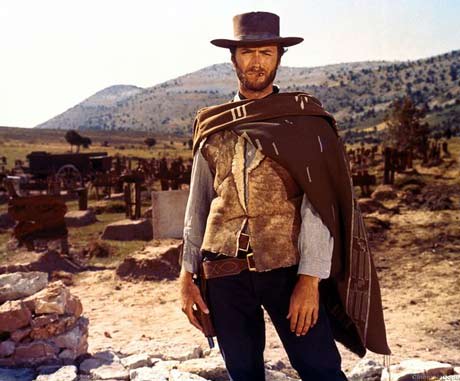Clint Eastwood stepped behind the camera for his first western in 1973 with High Plains Drifter, in which he also portrayed the titular unnamed stranger who may or may not be the ghost of a murdered marshal hell-bent on revenge. It's a flimsy conceit that dresses the bare bones of a story in a lot of moody atmosphere, while unapologetically offering an impenetrable protagonist whose churlish behaviour makes it almost an outright challenge for the audience to actually like him.
Eastwood's drifter rides into the mining town of Lago and immediately draws the suspicious stares of nearly all its residents. When a stop at the bar leads to him being followed into a barbershop by some local tough guys, he's forced to quickly dispose of the group of them. By the time he's eventually approached by the sheriff about protecting the town against impending danger, he's already raped a woman and holed up in the local hotel.
The community harbours a dark secret about a marshal that was killed with bullwhips in the streets by a group of men while the whole town watched. Those gunfighters, after serving time in prison for the crime, are expected to imminently return to settle the score with the town. Once his terms are finally met, the stranger begins making necessary plans for their arrival, while acting afoul of nearly everyone except a dwarf named Mordecai (Billy Curtis).
Eastwood, after working with Sergio Leone on his classic trilogy of spaghetti westerns, seemingly takes great pleasure in subverting any notions of a traditional western hero. His twisted antihero is a misogynistic son-of-a-bitch who, wisely, is never overtly referenced to be the reincarnation or spirit of the marshal whose murder continues to haunt his dreams. Instead, his identity is mostly revealed in the way he's regarded by all with a pervasive sense of guilt and fear, and how he responds in kind by abusing them as if feeling it's only fair after what they've done.
High Plains Drifter isn't so much about what happens as how it happens. A cloud of dread gathers from the first frame and slowly takes hold, casting a spell with the striking, bleached look of the barren landscapes, along with every portentous look exchanged or startling flashback. It doesn't have the weight of a classic western because of its slight premise, but it certainly stands out in the genre as a tense ghost story.
Apparently, Eastwood (or anyone else for that matter) couldn't be bothered to discuss this film for its 40th anniversary release, as there are no extras whatsoever to be found on the disc. It makes the whole thing seem like a pretty hollow celebration of the milestone and a little like a cash grab, but that doesn't take away from the quality of the original.
(Universal)Eastwood's drifter rides into the mining town of Lago and immediately draws the suspicious stares of nearly all its residents. When a stop at the bar leads to him being followed into a barbershop by some local tough guys, he's forced to quickly dispose of the group of them. By the time he's eventually approached by the sheriff about protecting the town against impending danger, he's already raped a woman and holed up in the local hotel.
The community harbours a dark secret about a marshal that was killed with bullwhips in the streets by a group of men while the whole town watched. Those gunfighters, after serving time in prison for the crime, are expected to imminently return to settle the score with the town. Once his terms are finally met, the stranger begins making necessary plans for their arrival, while acting afoul of nearly everyone except a dwarf named Mordecai (Billy Curtis).
Eastwood, after working with Sergio Leone on his classic trilogy of spaghetti westerns, seemingly takes great pleasure in subverting any notions of a traditional western hero. His twisted antihero is a misogynistic son-of-a-bitch who, wisely, is never overtly referenced to be the reincarnation or spirit of the marshal whose murder continues to haunt his dreams. Instead, his identity is mostly revealed in the way he's regarded by all with a pervasive sense of guilt and fear, and how he responds in kind by abusing them as if feeling it's only fair after what they've done.
High Plains Drifter isn't so much about what happens as how it happens. A cloud of dread gathers from the first frame and slowly takes hold, casting a spell with the striking, bleached look of the barren landscapes, along with every portentous look exchanged or startling flashback. It doesn't have the weight of a classic western because of its slight premise, but it certainly stands out in the genre as a tense ghost story.
Apparently, Eastwood (or anyone else for that matter) couldn't be bothered to discuss this film for its 40th anniversary release, as there are no extras whatsoever to be found on the disc. It makes the whole thing seem like a pretty hollow celebration of the milestone and a little like a cash grab, but that doesn't take away from the quality of the original.
